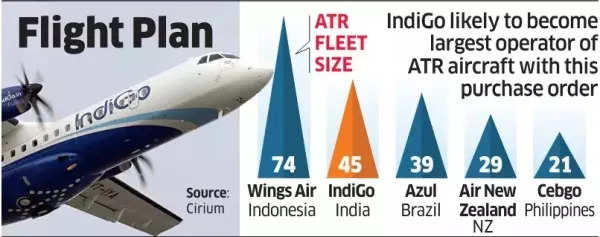IndiGo, India’s largest airline, is in discussions with ATR, Embraer, and Airbus to expand its regional network by ordering at least 100 smaller aircraft. The airline currently operates 45 ATR-72 planes with a seating capacity of 78 and is set to receive five more this year.
Sources familiar with the matter suggest that IndiGo is likely to continue its partnership with ATR to leverage economies of scale.
However, the Airbus A220 and Embraer’s E-175 planes are also being considered, according to an ET report.
This move to strengthen its domestic network follows IndiGo’s recent decision to enter the international long-haul market. On April 25, the carrier announced an order for 30 Airbus A350-900 wide-body aircraft.
Apart from the ATRs, which are turboprops, IndiGo’s fleet comprises Airbus A320s and A321s, as well as two Boeing 777s on short-term lease from its codeshare partner, Turkish Airlines.
As the carrier responsible for 60% of India’s domestic air traffic, IndiGo recognizes the potential in smaller towns where demand for air travel is expected to increase significantly due to improved airport infrastructure and the government’s UDAN scheme, which aims to develop and incentivize regional air connectivity.
IndiGo Flight Plan
ATR has earlier said that it anticipates India becoming its largest market within the next ten years, driven by the growth in regional air connectivity. “People want more convenience and a faster way to go around,” said Jean-Pierre Clercin, ATR’s Asia-Pacific commercial head, in February. “The other means of transport are growing but aren’t catching up with the pace of demand. Therefore, regional aviation has a huge role to play.”
In 2017, IndiGo made a significant move by ordering 50 ATR-72 aircraft, venturing into the regional aviation market previously dominated by SpiceJet’s Bombardier Q400 planes. Since then, IndiGo has expanded its operations, connecting around 60 destinations with these aircraft, including recently added locations such as Gondia, Lakshadweep, Jagdalpur, Jharsuguda, and Dharamshala.
According to an IndiGo executive, the ATR-72s have been instrumental in developing the network by enabling cost-effective flights to new destinations that may not have sufficient traffic to fill a larger 180-seat Airbus A320.
“But once IndiGo is able to establish reliable connectivity, the market size increases, allowing the airline to induct the bigger A320 or A321 jets,” the executive said.
Also Read | Flight delayed after boarding? New rule offers big relief to flyers stuck inside aircraft
The financial difficulties faced by IndiGo’s competitors have led to their inability to sustain flights on UDAN routes. The UDAN scheme offers a three-year exclusivity period to the successful bidder, but airlines like SpiceJet and Flybig often discontinue flights on these routes once the exclusivity ends.
For example, SpiceJet halted its flights to Jharsuguda in Odisha after IndiGo commenced operations there in October last year. A travel agent in the city noted, “IndiGo’s entry has increased the reliability of the service as there are hardly any cancellations.”
The smaller aircraft have also provided IndiGo with greater flexibility, enabling the airline to operate flights between two cities during off-peak hours.
Government officials anticipate increased investments in regional connectivity after the elections, recognizing their positive impact on economic productivity. In January, Civil Aviation Minister Jyotiraditya Scindia announced that the Centre has planned an investment of Rs 1 lakh crore to expand the number of airports from 148 to 200 over the next four years.


